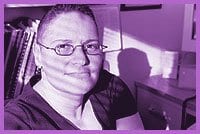Queer teachers have been told repeatedly that the more visible we are as teachers, the easier it will be for youth to come out safely and proudly. I have been an out lesbian for more years than I would like to count, and it’s been more than a decade since I have been working within the education system on issues of anti-homophobia.
But I’ve found developing and maintaining ethics and boundaries with my students has been complicated because I am an out lesbian.
I started doing front-line work with elementary and secondary students and staff on a range of equity issues including homophobia. After coming out a couple hundred times in front of diverse groups of people – some actively hostile, some passively hostile and some not hostile at all – I had become quite skilled at coming out with the correct combination of humour and earnestness and I believed I had seen everything. I was wrong.
As a classroom teacher, I taught two different groups of students. One at the Triangle Program, Canada’s only high school classroom for queer students. It’s housed within Oasis Alternative Secondary School, a school for at-risk youth. Oasis also hosted my other class: a co-op program where the students were almost entirely straight-identified.
I decided to come out to my co-op class early in the school year during a lesson on social identity. These students who are stereotyped as unsuccessful and dangerous turned out to be less hostile than some of the crowds of teachers I had in-serviced. This is probably due in part to the incredible power a classroom teacher has, and in part to the fact that these students were some of the most marginalized.
Following that lesson, students began to take a keen interest in me. They asked me many questions about being a lesbian. The questions were familiar to me because of my previous work, but now, as a classroom teacher, my relationship with them was ongoing. Their questions seemed more intrusive somehow. At times I felt they treated me like an exotic lesbian pet – the zebra in the classroom.
During a Friday morning lesson about occupational health and safety, a student put up his hand. “Do you want to come out with us tonight? A bunch of us are going out partying.”
I’m usually pretty quick on my feet, but I stood there for several seconds with my mouth hanging open. When I recovered, I tried to explain my role. I could be a great friend or a great teacher, but not necessarily both at the same time. A friendship is a mutual relationship where both parties get their needs met – and my needs were not their concern.
Why would these students want to hang out with an almost 40-year-old teacher, as old as some of their parents and not all that hip?
Well, many of them had never met an out lesbian or gay person before. Most of them equated being lesbian or gay with sex. So they may have interpreted my coming out as wanting to tell them about sex and about something most people keep secret. And who do most of these young people share secrets with? Friends. My role became blurred for them.
I took a great deal of time talking with them about teacher and student roles, and developing ground rules to help them understand what coming out means and what it doesn’t. I wouldn’t have done it differently. At the end of the year, the one out gay male student in class said, “Thank you for being out. I think I would have gotten my ass kicked if you weren’t there.”
Being an out teacher working with the queer students at the Triangle Program brought its own unique issues.
The Triangle staff work to create a safe environment for young people to explore their sexual identities, and many students begin to express themselves freely there. For some male-to-female transsexual/transgender students, this might mean being able to wear a dress and makeup to school for the first time. Or it might mean being able to hold hands with a same-sex partner at school. Or for a young lesbian, it may mean telling another young woman that they have a crush on them for the first time. All of these scenarios are wonderful and hopeful.
But they can all turn into a horror show without a degree of containment. Makeup application or eyebrow tweezing during math class or passionate kissing between students within a classroom setting are obviously not acceptable modes of self-expression. Often my role at Triangle became helping students to develop their own boundaries and to respect the boundaries of others.
At the end of my first year at Oasis, a gay male student asked me whether we could become friends “now that the student-teacher thing was over.” I was truly taken off guard. I told him I could offer him something better: I could be available in his life as a supportive adult whenever he needed me.
It’s now four years later and I have a number of former students in my life. Sometimes I feel like a mom, sometimes an auntie, sometimes a big sister, but never a friend. These youth are still struggling. They need my support without the burden of having to meet my needs.
Is it worth it? Through all the joys, the sorrows, the conflicts and yes, the drama, you bet it’s worth it.
* Vanessa Russell is an instructional leader with the Toronto District School Board’s equity department. A longer version of this article appeared in Education Forum and is reprinted here by permission.

 Why you can trust Xtra
Why you can trust Xtra


